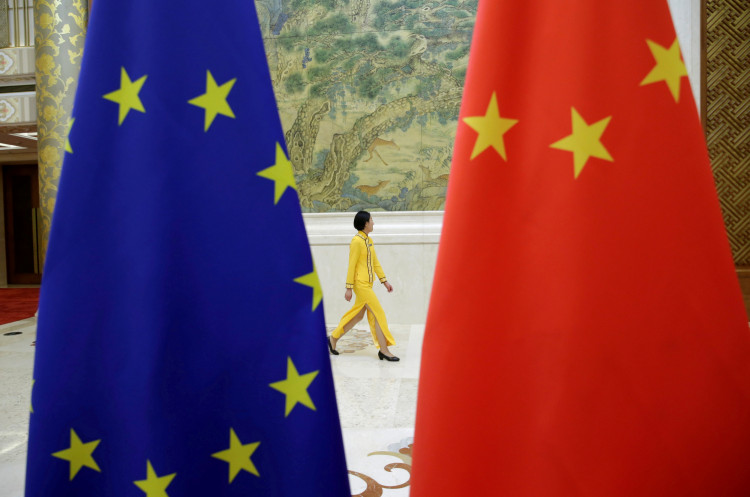On December 7, the 24th China-EU Leaders' Meeting was held in Beijing, marking the first in-person meeting under this mechanism in four years. Gwenn Sonck, Secretary-General of the EU-China Business Association (EUCBA) and President of the Flanders-China Chamber of Commerce (FCCC), spoke at a seminar on December 5 about the EU-China business relationship. Sonck noted the high dependency of European and Chinese companies and economies on each other, with the EU's direct investment in China reaching over 140 billion euros and China's direct investment in the EU nearing 120 billion euros in the past two decades. However, he acknowledged that global geopolitical changes are making business activities increasingly complex.
Sonck pointed out that while Chinese investment in Europe has declined, the nature of the investment has significantly changed. Greenfield investments, driven by electric vehicle battery factories, now dominate China's investment activities in Europe, with Chinese companies becoming major participants in Europe's green transformation.
Sonck added that compared to other major economies, China remains one of the fastest-growing economies globally, with its economic performance in 2023 exceeding expectations. He emphasized that the EU and China need each other more than ever.
A report by Rhodium Consulting in May this year indicated a continuing decline in China's direct investment in Europe (EU 27 and the UK), reaching a ten-year low in 2022 with a 22% decrease to 7.9 billion euros. The decline was mainly due to a lack of mergers and acquisitions activities in Europe.
The newly effective EU Foreign Subsidies Regulation (FSR), which came into force on October 12, may further impact Chinese companies' mergers and acquisitions activities in Europe. The regulation grants the EU broad investigative powers to assess the impact of foreign subsidies on its internal market. Under this regulation, certain large-scale mergers, acquisitions, and government procurement activities within the EU that meet the triggering criteria must notify the European Commission for prior approval.
Bram Hoorelbeke, a lawyer specializing in EU competition and regulatory affairs at Baker McKenzie, revealed that within just over a month of the new rules taking effect, 34 major transactions have already been reported to EU regulators, indicating a significant impact on many companies. However, he noted that it is unclear how many of these transactions involve Chinese companies, as he did not see any in the few cases he observed.
Hoorelbeke also mentioned that Brussels institutions are not obligated to disclose this information. However, summaries might be published in EU official publications, allowing some information to become publicly available.
There are concerns that Chinese state-owned enterprises might be a potential primary target of the new EU regulations. Hoorelbeke stated that not only state-owned enterprises but also large multinational companies are affected. The concept of "foreign financial subsidies" in the new regulation is very broad, creating a significant administrative burden for many foreign companies operating in the EU. In terms of implementation, companies need to investigate past financial conditions and undertake subsequent "self-certification" work, which he likened to an "administrative nightmare."
Hoorelbeke explained that defining the scope of "foreign financial subsidies" involves a lot of work. For example, in terms of the nature of funds, any financial transactions could fall within the scope, not just direct grants or subsidies. From equity incentives to loan preferences, and even benefits enjoyed within economic free zones, all these could be considered. Regarding the definition of foreign government agencies, community, local, and central governments are all within the scope, including informal government agencies or public entities like public hospitals and state-owned enterprises.
Additionally, the concept of "third countries" covers all countries outside the EU's 27 member states. "Countries like the UK, Switzerland, and Nordic countries like Norway are theoretically under this concept, and many companies may not realize this," Hoorelbeke said.
Dongkui Fang, Secretary-General of the China Chamber of Commerce to the EU (CCCEU), noted at the same event that although Chinese companies in the EU have a resilient growth trajectory, this growth is increasingly overshadowed by growing uncertainties.
He cited the CCCEU's latest research report, which showed that Chinese companies' assessment of the EU's business environment has declined for the fourth consecutive year. This decline is mainly attributed to regulatory barriers such as the Foreign Subsidies Regulation and the risks they pose.
Fang stated that while the policy aims to ensure fair competition, it inadvertently introduces layers of complexity and concerns, adversely affecting the business environment for Chinese companies. "About 70% of the surveyed companies wish for improved policy support from the EU, especially in areas like intellectual property, rights protection, and funding for industrial research and development activities."






